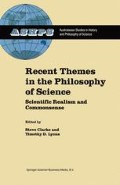Abstract
Philosophers’ attention has recently been drawn to the phenomenon of delusions with clear organic causes. Delusions are usually defined as beliefs with very implausible content that are maintained in the face of strong counterevidence.1 A satisfactory analysis of delusions must account for their being irrational beliefs and this raises interesting philosophical issues. First, the same phrase ‘irrational beliefs’ is considered by some to be paradoxical, or at least very problematic.2 If, in order to ascribe beliefs to a system S, we have to assume that S is rational, then how can we ascribe irrational beliefs to S? And, even if we are indifferent to the concerns derived from the rationality constraint on belief ascription, delusions remain a puzzle. Are they genuine beliefs? Are they really irrational? If so, how do they differ from other irrational beliefs?
Access this chapter
Tax calculation will be finalised at checkout
Purchases are for personal use only
Preview
Unable to display preview. Download preview PDF.
References
Aronson, E.: 1999, ‘Dissonance, Hypocrisy and the Self-Concept’, in E. Harmon-Jones and J. Mills (eds.), Cognitive Dissonance, American Psychological Association, Washington D.C., pp. 103–126.
Ayer, A.: 1946, Language, Truth and Logic, Victor Gollancz, London.
Baker, C. and Morrison, A.: 1998, ‘Cognitive Processes in Auditory Hallucinations: Attributional Biases and Metacognition’, Psychological Medicine 28, 1199–1208.
Berrios, G.: 1991, ‘Delusions as ‘Wrong Beliefs’: A Conceptual History’, British Journal of Psychiatry 159, suppl. 14, 6–13.
Breen, N., Caine, D. et al.: 2000, ‘Towards an Understanding of Delusions of Misidentification: Four Case Studies’, Mind & Language 15 (1), 74–110.
Campbell, J.: 1999, ‘Schizophrenia, the Space of Reasons, and Thinking as a Motor Process’, The Monist 82 (4), 609–625.
Cherniak, C.: 1986, Minimal Rationality, MIT Press, Cambridge (Mass.).
Davidson, D.: 1982, ‘Paradoxes of Irrationality’ in R. Wollheim (ed.), Philosophical Essays on Freud, Cambridge University Press, London, pp. 289–305.
Davidson, D.: 1985, ‘Incoherence and Irrationality’, Dialectica 39 (4), 345–354.
Davies, M. and Coltheart, M.: 2000, ‘Introduction: Pathologies of Belief’, Mind & Language 15 (1), 1–46.
Dennett, D.: 1987, The Intentional Stance, MIT Press, Cambridge (Mass.).
Festinger, L.: 1957, A Theory of Cognitive Dissonance, Stanford University Press, Stanford.
Garety, P.: 1991, ‘Reasoning and Delusions’, British Journal of Psychiatry 159, suppl. 14, 14–18.
Gerrans, P.: 2000, ‘Refining the Explanation of Cotard’s Delusion’, Mind & Language 15 (1), 111–122.
Heal, J.: 1998, ‘Understanding Other Minds from the Inside’ in A. O’Hear (ed.), Current Issues in Philosophy of Mind, Cambridge University Press, Cambridge, pp. 83–100.
Hemsley, D. and Garety, P.: 1986, ‘The Formation and Maintenance of Delusions: a Bayesian Analysis’, British Journal of Psychiatry 149, 51–56.
Jones, E.: 1999, ‘The Phenomenology of Abnormal Belief: A Philosophical and Psychiatric Inquiry’, Philosophy, Psychiatry, and Psychology 6 (1), 1–16.
Kahneman, D., Tversky, A. and Slovic, P.: 1982, Judgement Under Uncertainty: Heuristics and Biases, Cambridge University Press, Cambridge.
Kuhn, T.: 1970, The Structure of Scientific Revolutions, University of Chicago Press, Chicago.
Langdon, R. and Coltheart, M.: 2000, ‘The Cognitive Neuropsychology of Delusions’, Mind & Language 15 (1), 184–218.
Leeser, J. and O’Donohue, W.: 1999, ‘What Is a Delusion? Epistemological Dimensions’, Journal of Abnormal Psychology 108 (4), 687–694.
Maher, B.: 1974, ‘Delusional Thinking and Perceptual Disorder’, Journal of Individual Psychology 30, 98–113.
Maher, B.: 1999, ‘Anomalous Experience in Everyday Life: Its Significance for Psychopathology’, The Monist 82 (4), 547–570.
Mele, A.: 1987, Irrationality. An Essay on Akrasia, Self-deception and Self-control, Oxford University Press, Oxford.
Nisbett, R. and Ross, L.: 1980, Human Inference: Strategies and Shortcomings of Social Judgment, Prentice-hall, Englewood Cliffs N.J.
Payne, R.: 1992, ‘My Schizophrenia.’, Schizophrenia Bulletin 18 (4), 725–728.
Reid, I., Young, A. et al.: 1993, ‘Voice Recognition Impairment in a Blind Capgras Patient’, Behavioural Neurology 6 (4), 225–228.
Rust, J.: 1990, ‘Delusions, Irrationality and Cognitive Science’, Philosophical Psychology 3 (1), 123–137.
Sass, L.: 1994, The Paradoxes of Delusion, Cornell University Press, Ithaca and London.
Silva, J., Leong, G. et al.: 1994, ‘Delusional Misidentification Syndromes and Dangerousness’, Psychopathology 27, 215–219.
Stone, T. and Young, A.: 1997, ‘Delusions and Brain Injury: The Philosophy and Psychology of Belief’, Mind & Language 12, 327–364.
Wittgenstein, L.: 1969, On Certainty, Blackwell, Oxford.
Young, A.: 2000, ‘Wondrous Strange: The Neuropsychology of Abnormal Beliefs’, Mind & Language 15 (1), 47–73.
Author information
Authors and Affiliations
Editor information
Editors and Affiliations
Rights and permissions
Copyright information
© 2002 Springer Science+Business Media Dordrecht
About this chapter
Cite this chapter
Bortolotti, L. (2002). Marks of Irrationality. In: Clarke, S., Lyons, T.D. (eds) Recent Themes in the Philosophy of Science. Australasian Studies in History and Philosophy of Science, vol 17. Springer, Dordrecht. https://doi.org/10.1007/978-94-017-2862-1_8
Download citation
DOI: https://doi.org/10.1007/978-94-017-2862-1_8
Publisher Name: Springer, Dordrecht
Print ISBN: 978-90-481-6107-2
Online ISBN: 978-94-017-2862-1
eBook Packages: Springer Book Archive

